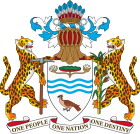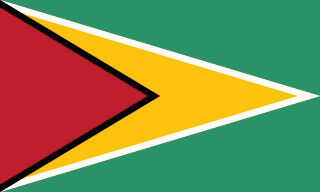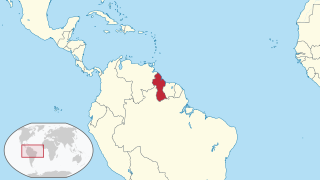 |
|---|
| Constitution |
The Union of Guyanese International (UGI) was a political party in Guyana led by Lindley GeBorde.
 |
|---|
| Constitution |
The Union of Guyanese International (UGI) was a political party in Guyana led by Lindley GeBorde.
The UGI contested the 1992 general elections, although its name was wrongly printed on ballot papers as United Guyanese International. [1] In the elections the party received just 134 votes and failed to win a seat. [2] It ran in the 1994 local elections, [3] but did not contest any further elections at national level.

The politics of Guyana takes place in a framework of a representative democratic assembly-independent republic, whereby the President of Guyana is the head of government and of a multi-party system. Executive power is exercised by the President, advised by a cabinet. Legislative power is vested in both the President and the National Assembly of Guyana. The judiciary is independent of the executive and the legislature.
The history of Guyana begins about 35,000 years ago with the arrival of humans coming from Eurasia. These migrants became the Carib and Arawak tribes, who met Alonso de Ojeda's first expedition from Spain in 1499 at the Essequibo River. In the ensuing colonial era, Guyana's government was defined by the successive policies of Spanish, French, Dutch, and British settlers. During the colonial period, Guyana's economy was focused on plantation agriculture, which initially depended on slave labor. Guyana saw major slave rebellions in 1763 and 1823. Following the Slavery Abolition Act of 1833, 800,000 enslaved Africans in the Caribbean and South Africa were freed, resulting in plantations contracting indentured workers, mainly from India. Eventually, these Indians joined forces with Afro-Guyanese descendants of slaves to demand equal rights in government and society. After the Second World War, the British Empire pursued policy decolonization of its overseas territories, with independence granted to British Guiana on May 26, 1966. Following independence, Forbes Burnham of the rose to power, quickly becoming an authoritarian leader, pledging to bring socialism to Guyana. His power began to weaken following international attention brought to Guyana in wake of the Jonestown mass murder suicide in 1978.

Cheddi Berret Jagan was a Guyanese politician and dentist who was first elected Chief Minister in 1953 and later Premier of British Guiana from 1961 to 1964. He later served as President of Guyana from 1992 to his death in 1997. In 1953, he became the first person of Indian descent to be a head of government outside of the Indian subcontinent.

Hugh Desmond Hoyte was a Guyanese politician who served as Prime Minister of Guyana from 1984 to 1985 and President of Guyana from 1985 until 1992.

Linden Forbes Sampson Burnham was a Guyanese politician and the leader of the Co-operative Republic of Guyana from 1964 until his death in 1985. He served as Premier of British Guiana from 1964 to 1966, Prime Minister of Guyana from 1964 to 1980 and then as the first Executive President of Guyana from 1980 to 1985. He is often regarded as a strongman who embraced his own version of socialism.

The Guyana Action Party (GAP) is a left-wing political party in Guyana representing the indigenous Amerindian population.

David Arthur Granger is a Guyanese former politician and retired military officer who served as the ninth president of Guyana from 2015 to 2020. A member of the People’s National Congress (PNC), he previously served as Commander of the Guyana Defence Force and as National Security Adviser from 1990 to 1992. He was leader of the Opposition in the National Assembly of Guyana from 2012 to 2015.

Bilateral relations have been established between Guyana and the United States of America.

The following outline is provided as an overview of and topical guide to Guyana:

Guyana, officially the Co-operative Republic of Guyana, is a country on the northern mainland of South America. Guyana is an indigenous word which means "Land of Many Waters". The capital city is Georgetown. Guyana is bordered by the Atlantic Ocean to the north, Brazil to the south and southwest, Venezuela to the west, and Suriname to the east. With a land area of 215,000 km2 (83,000 sq mi), Guyana is the third-smallest sovereign state by area in mainland South America after Uruguay and Suriname, and is the second-least populous sovereign state in South America after Suriname; it is also one of the least densely populated countries on Earth. It has a wide variety of natural habitats and very high biodiversity.

The following is an alphabetical list of topics related to the Co-operative Republic of Guyana.

The Constitution of Guyana is the highest governing document in the Republic of Guyana. It came into effect on October 6, 1980, replacing the constitution enacted in 1966 upon its independence from the United Kingdom. The current Constitution of Guyana contains 12 chapters that are further divided into 232 articles. It also contains a preamble and an oath. Since its 1980 enactment, it has gone through multiple amendments.

General elections were held in British Guiana on 27 April 1953. They were the first held under universal suffrage and resulted in a victory for the People's Progressive Party (PPP), which won 18 of the 24 seats in the new House of Assembly. Its leader, Cheddi Jagan, became Prime Minister.

The National Labour Front (NLF) was a political party in Guyana.

The National Democratic Party (NDP) was a political party in British Guiana led by Rudy Kendall.

The Guyana Labour Party (GLP) was a political party in Guyana.

Snap general elections were held in Guyana on 2 March 2020. They were called early after the government of President David A. Granger lost a vote of no confidence by a margin of 33–32 on 21 December 2018, the government having held a one-seat majority since the 2015 elections. However, one of its own MPs, Charrandas Persaud of the Alliance for Change (AFC), voted with the opposition. Granger announced on 25 September 2019 that the elections would be held on 2 March 2020.

Mohamed Irfaan Ali is a Guyanese politician serving as the tenth and current president of Guyana since 2020. A member of the People’s Progressive Party/Civic (PPP/C), he previously served as the minister of Housing and Water from 2009 to 2015. He is the first Muslim to hold office, and is the second Muslim head of state in the Americas after Noor Hassanali of Trinidad and Tobago.

The 2023 Guyanese local elections, officially due since 2020, were held on Monday, June 12, 2023, following the latest delay of the officially biennial polls by three years due to lawsuits and vacanies at the Guyana Elections Commission (GECOM) following the fallout and misconduct of the 2020 Guyanese general election and the COVID-19 pandemic. All 1,220 council seats within 610 constituencies across Guyana's 80 local authority areas (LAAs), comprising 70 neighbourhood democratic councils (NDCs) and 10 municipalities are being conteted. GECOM has stated that voting is not required in 291 constituencies in which the ruling People's Progressive Party/Civic (PPP/C) has won by acclamation due to no other candidates running against them. As a result the PPP/C has retained control and has won allseats in LAAs such as the NDCs of Leguan, La Jalousie/Nouvelle Flanders, Canals Polder, Little Diamond/Herstelling, Ordnance Fort Lands/ No. 38, Kintyre/No. 37 or Borlam, Kilcoy/Hampshire, Port Mourant/John, Bloomfield/Whim, No. 64/No. 74, the municipality of Lethem and has also gained control of the Aranaputa/ Upper Burro Burro NDC. The PPP/C is hoping to win over A Partnership for National Unity (APNU)/People's National Congress Reform (PNCR)opposition strongholds, campaigning heavily in Guyana's capital city, Georgetown, which has remained in APNU/PNCR control since independence from the United Kingdom in 1966. Efforts by the PNCR to postpone or cancel the elections via litigation regarding the electoral roll and local government constituency boundaries, were dismissed by Guyana's High Court in the lead-up to these elections, claiming that, these issues are behind its no-contest of 291 constituencies across the 80 LAAs. The opposition Alliance for Change (AFC), the junior coalition partner of the APNU, has boycotted the 2023 local elections over similar concerns.